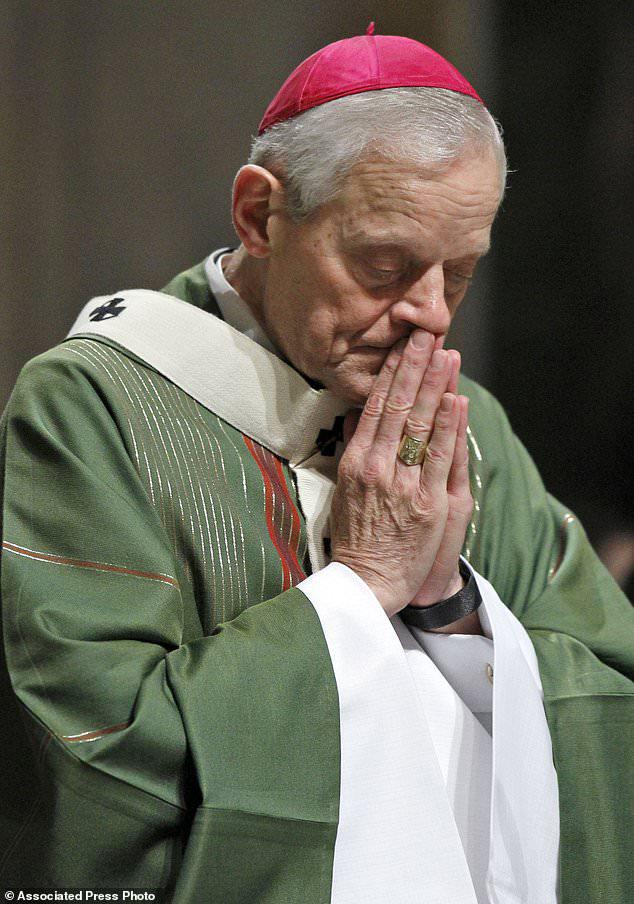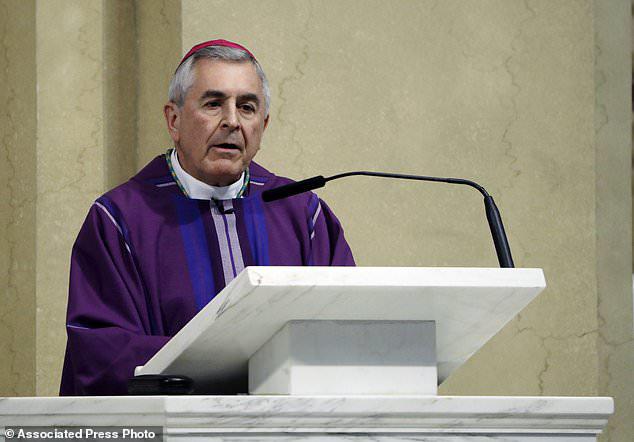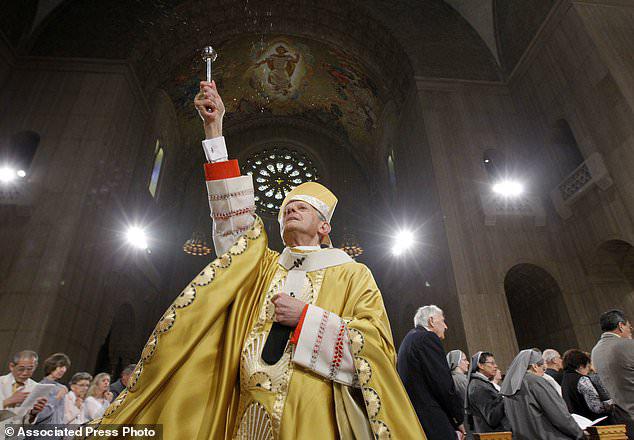|
How the Catholic church used a 'playbook' to cover up abuse in Pennsylvania and sent priests to 'treatment centers' - but many ignored the advice
By Hannah Parry
[with video]
An FBI investigation has found that the Catholic church had a 'playbook' for covering up sex abuse crimes by its priests. A grand jury report released Tuesday, revealed that hundreds of Roman Catholic priests in Pennsylvania have molested more than 1,000 children and that senior church officials, including the now archbishop of Washington, D.C. covered up the abuse. The report said the numbers of actual victims and abusers could be much higher. It found that the church systematically covered up the abuse using 'a playbook for concealing the truth.' State Attorney General Josh Shapiro said at a news conference: 'We saw Catholic priests weaponizing their faith, using their faith as a tool of the abuse, and all the while the bishops, the monsignors, the cardinals covered it up.' The grand jury report found that while each case differed slightly, they way the church handled them was 'as if there was a script,' the York Daily Record reports. 'While each church district had its idiosyncrasies,' the grand jury reported, 'the pattern was pretty much the same. The main thing was not to help children, but to avoid 'scandal.' That is not our word, but theirs.' The FBI's National Center for the Analysis of Violent Crime found that the church used a number of techniques for avoiding bringing attention to assault claims. Such as never using words such as rape in reference to such claims, but simply calling them 'boundary issues' or 'inappropriate contact' One priest, accused of repeatedly violently sexually assaulting children, was referred to as having 'his difficulties.' Rather than investigate, the church would simply ask suspected abusers about the claims and accepted what they said without question, the report stated. If the claims against a priest began to mount, he would be transferred to a new parish where no one knew his reputation - a practice which became common, according to the report. In one case, a priest was moved from Allentown to New Mexico and then west Texas after multiple accusations of abuse emerged. He was finally arrested in Briscoe County, Texas, for molesting a boy. If the abuse claims became such a problem that the priest needed to be removed from the church, their absence would be explained as 'sick leave'. Or they would simply be removed without warning. When they were removed, they would not be reported to police but would be sent for 'evaluation' at a church-run psychiatric facility. St. Luke's Institute, e in Silver Spring, Maryland, was commonly used to 'treat' priests accused of abuse. The report states that at least 30 priests have been sent to the institute over the past few decades including Father Joseph Mueller in April 1986 after he tried to pull down the pants of a teenager. Rev. Richard Terdine was sent after he allegedly patted the genital area of a boy. St. Luke's is a Catholic organization which originally opened to treat addition but broadened its treatment to other issues. But even if the institute did find the priest was a danger to others, it was up to the church to act. In 1996, St. Luke's warned Edward Kryston of the Diocese of Pittsburgh, should have 'NO contact with adolescents' and he should avoid any ministry focused on junior or high school students, adding that there was cause for 'extreme caution'. The information was sent to Bishop Donald Wuerl who still appointed Kryston as a parochial vicar at St. Albert the Great in Baldwin in 1996. He became pastor there three years later. In 1988, St Lukes recommended Father James E. Somma should not be allowed at home alone with children and adolescents. Yet, he was allowed to remain in the priesthood until at least 2002. During that time, at least one victim accused Somma of sexually abusing him, adding that he often saw 'the same boys hung around the rectory with him.' Wuerl was alerted about another priest in October 1998, Rev. Paul Spisak, who was found to have compulsive sexual disorder and 'significant interest in grade school boys.' Wuerl assigned Spisak to residence at St. Mary of Mercy in Cecil. Spisak wasn't removed from ministry until 2003 after more allegations were made. Other treatment centers included St. John Vianney and Southdown Institute. The grand jury said the centers 'allow these experts to 'diagnose' whether the priest was a pedophile, based largely on the priest's 'self-reports',' and regardless of whether the priest had actually engaged in sexual contact with a child.' The final but one of the most important rules in the church, according to the report, was not to call the cops about sex abuse allegations. 'Handle it like a personnel matter, 'in house,' the grand jury reported. A top Pennsylvania Catholic leader has since vowed to ensure abuses 'never recur' after the report and said Friday he has 'profound remorse' and offers his 'heartfelt apology' to the victims. Speaking at a Mass of forgiveness, Harrisburg Bishop Ronald Gainer opened by reading the first paragraph of this week's stunning report that said more than 300 predator priests had abused more than 1,000 children in six Pennsylvania dioceses. Forty-five of the priests named in the report served in the Harrisburg diocese. The first paragraph of the nearly 900-page report said the grand jury knows the truth: that child sex abuse within the Catholic church happened everywhere. 'In the name of our global church, I voice again my heartfelt sorrow and sincere apology to all survivors of clergy sexual abuse,' Gainer said. While acknowledging the church is faced with a 'spiritual crisis,' Gainer said most of the abuse happened long ago. The diocese has taken 'significant and effective measures to protect our children and remove any person who intends to do harm to them,' he said. The grand jury report criticized Gainer for failing to advocate the defrocking of an abusive priest. The diocese defended Gainer, saying he took swift action against that priest and another abusive priest after becoming bishop in 2014. In early August, the diocese released the names of 71 priests and other members of the church who had been accused of child sex abuse and said it was holding accountable all Harrisburg bishops of the last 70 years, announcing their names would be stripped from church properties. Friday's Mass attracted an unusually large turnout of some 350 worshippers. They included Irene Youngman, a retired social worker from Hershey, and her friend, Susan Shebosky, a retiree from Harrisburg, each of whom held a cigar box filled with white ribbons. They intended to distribute the ribbons as a way to show support for abuse victims. Youngman said she was so angry when the grand jury's report came out Tuesday that she stayed home from Mass that day. 'There's such a sense of betrayal. And an anger I have that the hierarchy isn't responding,' she said. 'I hope they will do more than they've done already. Hold the bishops accountable.' Shebosky encouraged fellow Catholics to speak up. 'Too many Catholics are in our homes, gnashing our teeth about this and I think we need to come out in a positive, supportive way and not let this be brushed aside,' she said. Steve Ciccocioppo Sr., a retired rail worker from Harrisburg, said the church had suffered a 'black eye,' but predicted it would 'withstand and grow stronger.' Ciccocioppo, who said he is a friend of Gainer's, expressed confidence in the bishop's leadership. 'He's deeply in turmoil about it, but he's going to put an end to this. Things are in the process of changing that need to be changed,' he said. The grand jury report faulted Gainer over his handling of the case of the Rev. Joseph Pease, an abusive priest who retired in 2003 after admitting to sexual misconduct with a minor. In a 2014 letter to the Vatican, Gainer said he didn't want to kick Pease out of the priesthood altogether, asking that he instead live the rest of his life 'in prayer and penance, without adding further anxiety or suffering to his situation, and without risking public knowledge of crimes.' The report cited another 2014 case in which Gainer failed to call for the defrocking of a priest who'd admitted that he'd sexually abused seven young girls, raping one of them over a period of years. The Rev. James Beeman had been suspended from ministry since 1991; he died in 2016. The diocese said in a statement that since canonical trials weren't a viable option against either priest at the time, Gainer took action to make permanent the existing penalties against each one. The form letter that Gainer sent in each case 'is regrettably not written well and does not accurately represent the action that was taken,' the statement said. 'Unlike recent attempts to portray this as a cover-up, this was the only means of resolving their canonical status.'
|
.
Any original material on these pages is copyright © BishopAccountability.org 2004. Reproduce freely with attribution.


